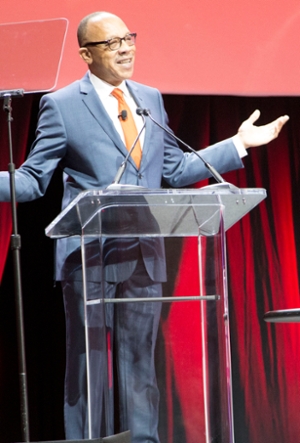Pulitzer-winning columnist Eugene Robinson on social justice and why 'all lives matter'

On the morning of Feb. 8, 1968, Eugene Robinson woke to see a row of cop cars in front of his home in Orangeburg, SC. Police crouched behind their vehicles, guns trained on a house across the street where anti-segregationist Cleveland Sellers was thought to be organizing a student protest of a racially segregated bowling alley in town.
Sellers was long gone. But later that evening, troopers opened fire on the protesters, claiming self-defense, though there was no evidence of violence, says Robinson. “When it was over, three young black men had been killed and some 27 others injured. Most were shot in the back and a few in the soles of their feet.”
At the urging of a college professor, Robinson would later write about what became known as the “Orangeburg Massacre.” The piece won top prize in a reporting contest, opening Robinson’s eyes to the world of journalism—and the Pulitzer-winning Washington Post columnist has had a front row seat on history ever since.
On Saturday while delivering the opening keynote at the annual conference of the Association of American of Medical Colleges in Baltimore, Robinson recalled the Orangeburg Massacre, his childhood and the end of “Jim Crow” era of government-sanctioned oppression to illustrate how far the country has come in terms of racial equity, and how far it has to go. “Black lives mattered then,” he says, “and black lives matter now. All lives matter.”
It’s a timely sentiment given the recent string of racially-charged protests over police shootings in Ferguson, Staten Island and Baltimore. But while some point to these events as a sign that race relations in America are getting worse, Robinson offered some perspective. However painful, he says, “We are now having an important, and much more open debate, about the inequalities of our justice system and other areas, including housing, transportation and, of course, health care.”
As a cub reporter for the San Francisco Chronicle, Robinson bore witness to events culminating in the murder of gay activist Harvey Milk. Later, while covering city hall for the Washington Post, he wrote about the popular, influential and controversial Washington DC Mayor Marion Barry. And he was a hired commentator for MSNBC the night Barack Obama was first elected President of the United States. “It was a moment I’ll never forget. ..one of the high points of my life,” he says.
That was 7 years ago. Now, with Obama is in his second term, “issues of race are arguably more aggravated and closer to the surface than they have been for many years,” Robinson says. Some blame Obama, which is absurd, he adds. “I think the fact of Obama’s presidency has a psychological impact that we don’t quite understand and we won’t understand for many years. …The fact that poor people are trapped in failing schools and substandard housing and in a justice system that treats them, not as citizens but as fodder, is not new. We’re just paying attention to it now.”
And that’s a good thing, believes Robinson, pointing to signs of progress on the social justice front, such as Affordable Care Act, which, for all its faults has reduced the nation’s uninsured rate and improved access to care. Conservative Republicans and progressive Democrats are now coming together around the need for justice reform, and the presidential race is forcing a discussion about inequality writ large.
“It’s in the air. It’s something that we’re arguing about and talking about. And this is how we make progress, such as it is, on issues of race and inequality in this country,” Robinson says. “It’s not smooth and it’s not happy. It’s herky jerky. …But I tend to take the hopeful view that we’re actually learning something, that 10 years from now hopefully we’ll look back and say we made some progress.”
Kirsten Stewart is a senior writer at University of Utah Health Sciences
